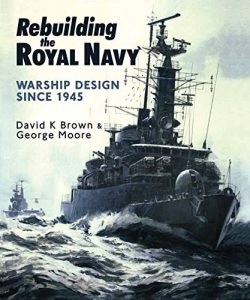This design history of post-war British warship development, based on both declassified documentation and personal experience, is the fourth and final volume in the author’s masterly account of development of Royal Navy’s ships from the 1850s to the Falklands War. In this volume the author covers the period in which he himself worked as a Naval Constructor, while this personal knowledge is augmented by George Moore’s in-depth archival research on recently declassified material.
The RN fleet in 1945 was old and worn out, while new threats and technologies, and post-war austerity called for new solutions. How designers responded to these unprecedented challenges is the central theme of this book. It covers the ambitious plans for the conversion or replacement of the bigger ships; looks at all the new construction, from aircraft carriers, through destroyers and frigates, to submarines (including nuclear and strategic), to minesweepers and small craft. The authors pay particular attention to the innovations introduced, and analyses the impact of the Falklands War.
At the start of the twenty-first century the Royal Navy is still a powerful and potent force with new and a number of innovative classes, both surface and sub-surface, coming on stream. This book offers a fascinating insight into how the post-war fleet developed and adapted to the changing role of the Navy.
The RN fleet in 1945 was old and worn out, while new threats and technologies, and post-war austerity called for new solutions. How designers responded to these unprecedented challenges is the central theme of this book. It covers the ambitious plans for the conversion or replacement of the bigger ships; looks at all the new construction, from aircraft carriers, through destroyers and frigates, to submarines (including nuclear and strategic), to minesweepers and small craft. The authors pay particular attention to the innovations introduced, and analyses the impact of the Falklands War.
At the start of the twenty-first century the Royal Navy is still a powerful and potent force with new and a number of innovative classes, both surface and sub-surface, coming on stream. This book offers a fascinating insight into how the post-war fleet developed and adapted to the changing role of the Navy.






